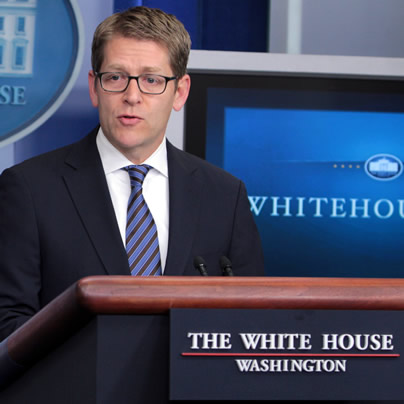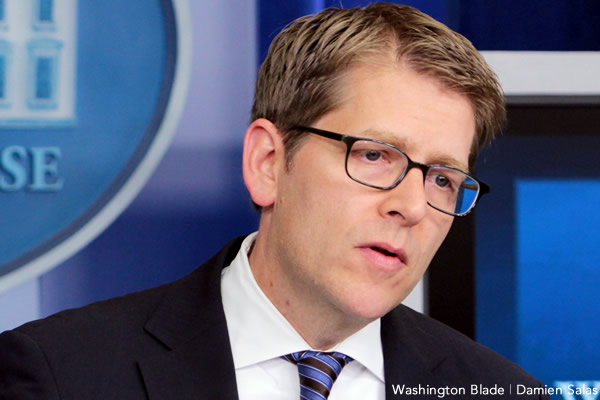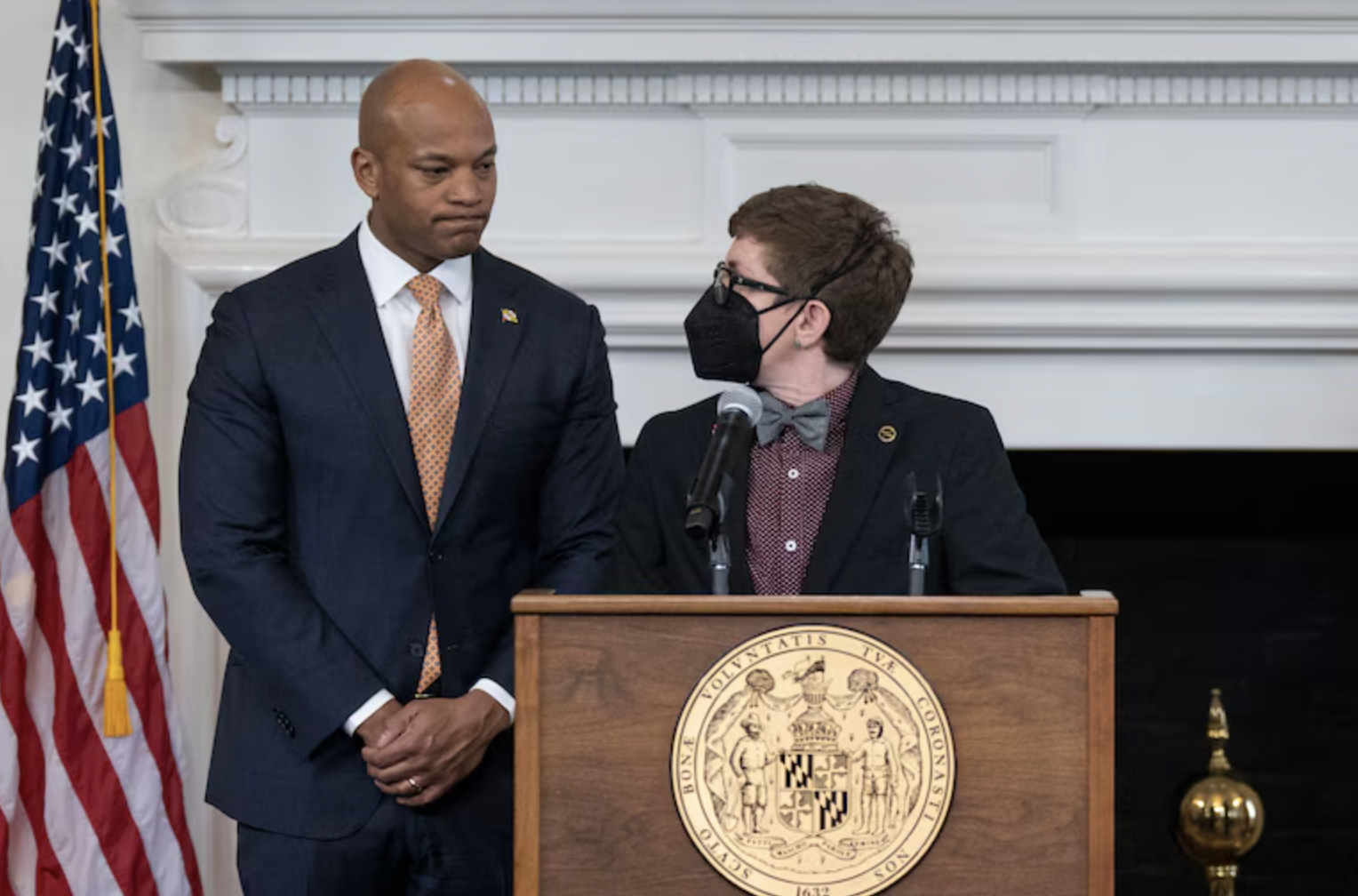News
Carney: Brewer ‘did the right thing’ by vetoing anti-gay bill
But controversy won’t prompt Obama to sign ENDA executive order


White House Press Secretary Jay Carney said Arizona Gov. Jan Brewer “did the right thing” by vetoing an anti-gay bill (Washington Blade file photo by Damien Salas).
White House Press Secretary Jay Carney said Friday Arizona Gov. Jan Brewer “did the right thing” by vetoing a controversial bill that would have enabled discrimination in her state against LGBT people.
In response to question from Sirius XM Radio’s Jared Rizzi, Carney articulated Obama’s support for Brewer’s veto of SB 1062, which would have enabled individuals and businesses to refuse services to individuals — including LGBT people — if engaging in that act violated a person’s religious beliefs.
“As I have noted, we don’t weigh in as a rule on every piece of legislation, but the president does believe that Gov. Brewer did the right thing by vetoing this bill,” Carney said.
Prior to the veto, Carney said the legislation sounds “pretty intolerant,” but didn’t offer full-throated opposition to the measure as no LGBT advocates called on Obama to weigh in. However, following a national outcry, including opposition from business leaders, Republican lawmakers and LGBT advocates, Brewer vetoed the legislation on Wednesday.
Carney’s words mark the first time the White House itself has spoken out on the Arizona bill in the aftermath’s of Brewer’s veto, although Labor Secretary Thomas Perez talked about it Thursday during an interview on MSNBC, saying the legislature’s approval of the measure was “personally baffling” as he renewed the administration’s call for the Employment Non-Discrimination Act.
But as the Daily Beast’s Scott Bixby notes, anti-LGBT discrimination is still allowed in Arizona even in the aftermath of Brewer’s veto. Arizona state law affords no protection to LGBT people either in public accommodations or employment, and no federal protections exist explicitly barring employment discrimination on the basis of sexual orientation or gender identity.
Under questioning from the Washington Blade, Carney said he had no updates when asked if President Obama sees an opportunity to sign a heavily sought-after executive order barring anti-LGBT job bias among federal contractors following the outcry over LGBT discrimination that lead to the Arizona veto.
“I don’t have any update on that matter,” Carney said. “We, of course, hope very much that further action will be taken in Congress on the Employment Non-Discrimination Act, a bill that if it became law would be far more comprehensive in its effect. But, as a general matter — and I said this about the Arizona bill last week — the president believes that all Americans regardless of sexual orientation or gender identity should be treated fairly and equally with dignity and respect.”
Still, Carney went on to acknowledge that the national outcry over the proposed legislation was significant and said Brewer’s veto was symbolic of the country’s progress on LGBT issues.
“And it was gratifying to see Americans from all walks of life, including business leaders, faith leaders, regardless of party, speak out against this measure — and it’s further evidence that the American people fundamentally believe in equality, and it’s time to get on the right side of history,” Carney said. “And as I mentioned before, I think we all note with pride and amazement the progress that this country has made on these issues in recent years, and I think this veto reflects on that progress, and on the sentiment of the American progress.”
When the Blade pointed that an executive order would be a much quicker way to capitalize on the symbolic nature of the veto because the legislative process in Congress would take longer, Carney once again turned to ENDA.
“Again, I don’t have new information to provide to you on a hypothetical executive order,” Carney said. “When I can tell you is we do support legislation that would enshrine in law the non-discrimination approach the president believes is the right approach for the country.”
Myanmar
LGBTQ advocacy group joins Myanmar earthquake relief effort
March 28 quake killed thousands, devastated country’s second-largest city

A powerful earthquake that rocked Myanmar on March 28 unleashed devastation across the central part of the country.
The U.S. Geological Survey measured the quake at 7.7, and pinpointing its epicenter roughly 10 miles west of Mandalay, the country’s second-largest city. A 6.4-magnitude aftershock jolted the area 12 minutes later, compounding the destruction and deepening the crisis for a nation already strained by conflict.
The earthquake struck with terrifying intensity near its epicenter, wreaking havoc on Mandalay and the nearby city of Sagaing.
Mandalay, a bustling city of approximately 1.5 million residents, bore the brunt of the destruction. Among the most striking losses was the 12-story Sky Villa Condominium, which collapsed, leaving scores trapped beneath the wreckage. Rescue workers scrambled to pull survivors from the rubble, but the rising death toll underscored the tragedy’s magnitude.
In Sagaing, which is located closer to the epicenter, more than 70 percent of buildings sustained damage. The Ava Bridge, an essential artery spanning the Irrawaddy River, collapsed, cutting off a critical connection to Mandalay. The earthquake’s shallow depth of less than seven miles amplified its power, reducing homes, temples, and schools to rubble.
The earthquake’s death toll continues to climb, with at least 3,649 confirmed dead, more than 5,000 injured, and approximately 145 people missing. Amid the widespread devastation, questions loom about the impact on vulnerable populations. The Washington Blade reached out to Colors Rainbow, an organization advocating for LGBTQ rights in Myanmar, to understand how the crisis has affected one of the nation’s most marginalized communities.
Colors Rainbow Executive Director Hla Myat Tun spoke about how his organization is working to address the crisis faced by Myanmar’s LGBTQ community in the aftermath of the earthquake.
Colors Rainbow has implemented a system of multipurpose cash transfers, directing funds to local LGBTQ partner organizations. These grassroots partners, in turn, provide essential support to affected individuals that includes emergency cash assistance, food, non-food items, clean water, and basic emotional support tailored to the immediate needs of their communities.
“We estimate that around 500–800 LGBTQ individuals have been impacted in the affected areas, particularly in Mandalay Region, Sagaing Region, and southern Shan state,” said Hla Myat Tun. “So far, we have been able to directly assist around 80–100 LGBTQ individuals.”
Hla Myat Tun told the Blade that Colors Rainbow is actively gathering data to assess the specific challenges that LGBTQ people are facing in the aftermath of the earthquake.
Preliminary observations, he noted, point to heightened vulnerability among LGBTQ people, driven by social exclusion and limited access to mainstream humanitarian aid. Hla Myat Tun, however, emphasized more comprehensive information is necessary to fully understand the scope of their needs and vulnerabilities in this crisis.
“We are partnering with international LGBTQ and feminist organizations that focus on displaced communities,” said Hla Myat Tun. “These partners provide emergency funds, and we coordinate with local LGBTQ groups to deliver aid directly to affected individuals on the ground.”
Addressing reports of military restrictions on humanitarian aid, Hla Myat Tun explained how Colors Rainbow is managing to reach LGBTQ people who are in conflict zones and areas the military junta controls. Hla Myat Tun highlighted the importance of the organization’s trusted local LGBTQ partners, who are embedded in these regions. Their presence and established networks, he said, are vital in navigating restricted areas and ensuring that aid reaches the LGBTQ people who are most in need.
Hla Myat Tun also provided insight into how Colors Rainbow is tailoring its relief efforts to meet the LGBTQ community’s specific needs.
He said his organization is gathering information directly from LGBTQ people through close coordination with its local partners, relying on both formal and informal communication channels. Hla Myat Tun told the Blade his team conducts daily check-ins via quick telephone calls, ensuring a continuous flow of information to guide their response efforts despite limited internet access, electricity and other challenges.
“Our approach is collaborative — we set strategies and share responsibilities to respond flexibly and safely, based on the rapidly changing local context,” he said. “Personal stories are being documented, but for security reasons, we are cautious about sharing them publicly.”
When asked whether staff or volunteers had harassment, discrimination, or violence while delivering aid — a concern given the precarious legal and social climate for LGBTQ people in Myanmar — Hla Myat Tun said there have been no reported incidents thus far.
“So far, we haven’t received any reports from our staff or local partners about harassment or violence while delivering aid,” he noted, emphasizing Colors Rainbow remains vigilant and has implemented robust safety protocols to protect all involved.
Colors Rainbow relies primarily on funding from international LGBTQ-focused partners. He noted, however, humanitarian funding specifically dedicated to LGBTQ communities remains vastly under-resourced, relative to the pressing needs on the ground. Hla Myat Tun said this shortfall severely limits the scale and reach of Colors Rainbow’s efforts.
“While Myanmar’s legal framework remains outdated, societal attitudes — especially during the civilian government — have shown signs of progress,” said Hla Myat Tun. “We have seen positive change thanks to the work of local LGBTQ organizations.”
“In the current crisis, many communities are working together despite legal barriers. However, in areas without LGBTQ-led organizations, inclusive humanitarian responses are still lacking,” he added. “There’s an urgent need for international humanitarian actors to understand and implement LGBTQ-inclusive practices in Myanmar.”
When asked about long-term strategies to support the recovery and resilience of LGBTQ communities as Myanmar rebuilds, Hla Myat Tun affirmed Colors Rainbow is deeply committed to fostering resilience. The organization’s initiatives include leadership development, community empowerment through training and workshops, sub-granting programs, and organizational development support. He also highlighted Colors Rainbow’s advocacy for LGBTQ-inclusive policies and collaboration with ethnic groups to promote an inclusive federal democracy, and specifically thanked Outright International, a global LGBTQ and intersex rights group, for “amplifying our work.
“This kind of international attention shines a spotlight on the challenges LGBTQ communities in Myanmar are facing and helps open doors for more support,” Hla Myat Tun told the Blade. “It also boosts visibility and solidarity, both locally and globally, which we deeply appreciate.”
Hungary
Hungarian MPs amend constitution to ban public LGBTQ events
Viktor Orbán’s government spearheaded amendment

Hungarian MPs on Monday voted to amend their country’s constitution to ban public LGBTQ events.
The vote took place less than a month after lawmakers banned Pride events and gave authorities the green light to use facial recognition technology to identify those who participate in them.
The Associated Press notes MPs approved the constitutional amendment — which Prime Minister Viktor Orbán’s Fidesz-KDNP coalition government proposed — by a 140-21 vote margin. Authorities before the vote removed a group of protesters who tried to block the entrance to a parliament parking garage.
Orbán’s government over the last decade has moved to curtail LGBTQ and intersex rights in Hungary.
A law that bans legal recognition of transgender and intersex people took effect in 2020. Hungarian MPs that year also effectively banned same-sex couples from adopting children and defined marriage in the constitution as between a man and a woman.
An anti-LGBTQ propaganda law took effect in 2021. The European Commission sued Hungary, which is a member of the European Union, over it.
MPs in 2023 approved the “snitch on your gay neighbor” bill that would have allowed Hungarians to anonymously report same-sex couples who are raising children. The Budapest Metropolitan Government Office in 2023 fined Lira Konyv, the country’s second-largest bookstore chain, 12 million forints ($33,115.76), for selling copies of British author Alice Oseman’s “Heartstopper.”
Former U.S. Ambassador to Hungary David Pressman, who is gay, participated in the Budapest Pride march in 2024 and 2023. Pressman was also a vocal critic of Hungary’s anti-LGBTQ crackdown.
The Washington Blade has reached out to Budapest Pride for comment on the constitutional amendment.
Maryland
FreeState Justice: Transgender activist ‘hijacked’ Moore’s Transgender Day of Visibility event
Maryland Commission on LGBTQIA+ Affairs describes Lee Blinder’s comments as ‘call to action’

FreeState Justice on April 11 released a statement criticizing the way that Trans Maryland Executive Director Lee Blinder treated Gov. Wes Moore during a Transgender Day of Visibility event.
FreeState Justice was extremely disappointed with the criticisms of Moore on the Transgender Day of Visibility, saying it was “hijacked by public hostility” by Blinder. The Baltimore Banner reported how Blinder “laid out how the Democratic governor has let down transgender Marylanders by not putting money in the budget and not backing needed policy changes.”
The Washington Blade interviewed Blinder after the March 31 event.
“The intention of what I shared is to show to the governor that this is a community in distress. You know, we are in a real state of emergency for the trans community and there are very few opportunities that the community has to share this directly with the governor.” Blinder told the Blade. “We’re really grateful to the governor for everything that he’s done in the past for this community, but the circumstances have changed and we really need to see very specific actions taken in order to ensure this community has the ability to exist in public space.”
FreeState Justice said Moore did not deserve such criticisms during the event and added in a Blade oped it is “time for new leadership on the Maryland LGBTQIA+ Commission. Leadership that values and prioritizes coalition over conflict. Leadership that invites feedback and shares power. Leadership that understands how Annapolis operates, how budgets are constructed, and how community victories are won.”
“We’re not saying don’t challenge power. We’re saying do it with purpose. Do it with facts. Do it with a strategy. If you’re going to call yourself a leader in this movement, show us the policy platform. Show us the data. Show us the budget line. Show us the work,” wrote FreeState Justice.
The Maryland Commission on LGBTQIA+ Affairs has met to address FreeState Justice’s statements.
“During the Transgender Day of Visibility ceremony at the State House, the commission’s chair offered remarks reflecting the real fears, concerns, and hopes of the trans community. These remarks were not a call-out, but a call to action,” the commission said in their call to action statement it sent to the Blade. “The chair’s words echoed the thousands of voices we’ve heard across the state through phone calls, emails, and messages on social media to our staff, commissioners, and their affiliated organizations.”
The statement outlines what the call to action entails, addressing what the commission found to be the most pressing issues for transgender Marylanders. They include a lack of dedicated funding, barriers to affirming healthcare, housing insecurity and homelessness, discrimination in education and employment, and escalating violence, harassment, and hate.
“We remain deeply committed to working in partnership with the Moore-Miller administration, the General Assembly, state agencies, nonprofit organizations, and community partners to ensure LGBTQIA+ Marylanders are seen, protected, and supported in policy, budget, and in practice,” reads the statement.
-

 District of Columbia4 days ago
District of Columbia4 days agoWorldPride organizers may warn trans people from abroad not to attend event
-

 Opinions3 days ago
Opinions3 days agoIt’s time for new leadership on the Maryland LGBTQIA+ Commission
-

 The White House3 days ago
The White House3 days agoWhite House does not ‘respond’ to reporters’ requests with pronouns included
-

 Noticias en Español4 days ago
Noticias en Español4 days agoINDIGNACIÓN: ¡El transfeminicidio de Sara Millerey en Colombia nos cuestiona como sociedad!










